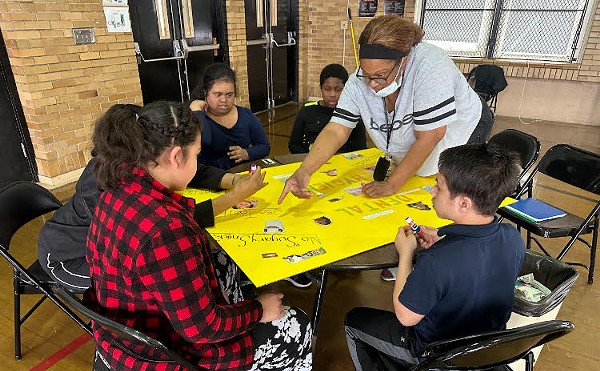Arriving a recent Saturday morning five minutes before going on air, J.T. Woods, longtime host of “Views & News,” a daily talk show on WLOU-1350 AM, found a memorandum from the station’s management posted on the doors of the station. The same note was taped to the studio microphone, outlining three policies he’d never seen before.
Dated Sept. 6, the memo was addressed to all broadcasters at WLOU-1350 AM and WLLV-1240 AM, which are owned by the same company, saying Federal Communications Commission and station policy prohibits anchors from endorsing, mentioning or interviewing political candidates between now and Election Day. Alarmed by its content, Woods says once he read the memo, he immediately took the subject to the airwaves.
Since then, Louisville’s oldest African-American radio station has been in a stir. The memo issued by management falsely claimed that FCC regulations restrict the political commentary of its on-air personalities. After LEO Weekly made several inquiries with the station’s owners and FCC headquarters, outcries from prominent members of Louisville’s black community eventually led the station to clarify the memo, removing references to the FCC and acknowledging that the policy is all its own.
“I found this disturbing,” Woods says. “You can’t even mention the name of the people from the two major political parties.”
LEO Weekly obtained a copy of the memo. It also said anchors are not permitted to interview candidates without prior approval from the station manager, and that if a conversation with a caller turns to talk of the candidates, it should be terminated. The memo adds that anyone who does not adhere to the policy will be immediately fired.
“If that’s the case, Rush Limbaugh needs to shut down his show for the next 60 days,” says DeVone Holt, host of Simmons Saturday Morning Solutions, a weekly broadcast on WLOU, sponsored by Simmons College of Kentucky. “There’s no way you can do news and not mention politics.”
Holt says implementing such a policy would silence an important voice of public opinion in the black community. Since 1948, the channels — basically one entity — have been broadcasting mainly to a black audience here. There is little other black presence on the airwaves in terms of substantive news in Louisville.
“We’ll have fewer outlets,” Holt says. “We can’t compromise our ability to speak openly and honestly.”
In a telephone interview last week, an attorney with the FCC’s political office said none of the bullet points in the memo reflected official agency rules. He said the station could, however, adopt stricter policies than those enforced by the FCC. Local affiliates often do that in response to community complaints.
Peter Davidson, president of New York-based Davidson Media Group, which owns the stations, says broadcasters must understand that local management must be watchful custodians of the airwaves, which have rules about using racist language, being partisan and endorsing candidates.
Late last week, Davidson said he hadn’t read the memo. However, he admitted the same rules for talk radio stations such as WHAS-AM apply to WLOU/WLLV, but until he could discuss it with management, he stands by their position.
“If it was put up by the general manager, it’s our policy,” he says.
The idea that public opinion could be stymied didn’t sit well with one of Louisville’s chief black ministers.
“As long as we are paying for our time on the air we will exercise our constitutional right,” says the Rev. Kevin Cosby, senior pastor at St. Stephen Baptist Church, Louisville’s largest black congregation, and president of Simmons College. “If our show is pulled off because we are engaging our people to think about the critical issues of the day, we don’t need to be on that station.”
Cosby says the memo was deceptive because it claimed to be official FCC policy. He said last week he would encourage everyone to abandon WLOU/WLLV if the station enacted the memo’s provisions.
The flexing worked.
“It was poor judgment on my part,” Vivien Ogburn, acting station manager, says. “I was under the impression that the memo was FCC policy. I have since learned it is not.”
Within days of Cosby’s proclamation, Ogburn, who was named to the position in May, said it was a mistake to post the memo without reviewing its provisions more closely. She said it had been used under the former station manager, Argie Dale; she was the station’s business manager at the time.
The intent was not to discourage commentary but to install a cautious protocol she believed was necessary after complaints during the Democratic presidential primary about hosts being partisan toward Barack Obama.
“We’re here to represent the community,” Ogburn says. “I’m worried about the reactions to the memo and plan to apologize for any misunderstanding.”
Prohibiting anchors from mentioning the candidates by name was excessive, she says. Ogburn plans to write a new memo outlining the station’s policies; however, she says WLOU/WLLV will maintain stricter rules than other talk radio stations because of its religious format.
“The focus has always been on conveying the gospel message. We do not want this to become a political battleground,” Ogburn says. “As Christians, our focus shouldn’t be on that.”
The idea that broadcasts could be curtailed by the religious overtones of the programming troubles some of the anchors.
“They used the FCC to take themselves off the hook,” Woods says. “Management knew what they were doing.”
He says his show gives black audiences a venue to champion and address issues important to the entire community. However, he says complaints by the religious community have often plagued shows that are critical of heavy religiosity.
“It’s good for some, but others may not like us,” he says. “That’s not a reason to take it to the degree they were talking about.”





